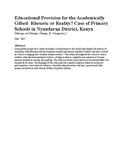| dc.contributor.author | Mathenge, wa Ndirangu | |
| dc.contributor.author | Mwangi, JK | |
| dc.contributor.author | Changeiywo, J | |
| dc.date.accessioned | 2013-06-29T06:48:24Z | |
| dc.date.available | 2013-06-29T06:48:24Z | |
| dc.date.issued | 2007 | |
| dc.identifier.citation | Eastern Africa Social Science Research Review Volume 23, Number 2, June 2007 pp. 55-69 | en |
| dc.identifier.uri | http://muse.jhu.edu/journals/eas/summary/v023/23.2mwangi.html | |
| dc.identifier.uri | http://erepository.uonbi.ac.ke:8080/xmlui/handle/123456789/42058 | |
| dc.description.abstract | Some gifted people have made invaluable contributions to the world that shaped the destiny of humanity. Identification and development of gifts and talents of gifted children has been viewed as critical in tapping this valuable human resource. This study investigated the extent to which children who had demonstrated evidence of high academic capability are assisted in Kenyan primary schools to nurture their gifting. The study revealed varied practices but showed that a lot remains to be done. The findings of the study provide a useful empirical basis for action by policymakers, curriculum developers, education administrators, teachers, parents and other people interested in educational welfare of gifted children. | en |
| dc.language.iso | en | en |
| dc.publisher | University of Nairobi | en |
| dc.title | Educational Provision for the Academically Gifted: Rhetoric or Reality? Case of Primary Schools in Nyandarua District, Kenya | en |
| dc.type | Article | en |

